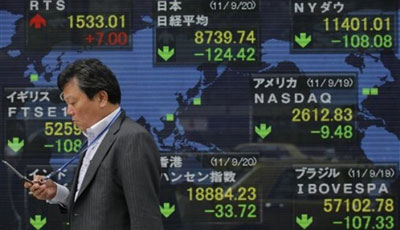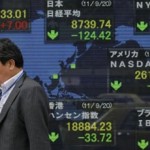Asian shares fall as Malaysia jet downing hits sentiment

Asian shares sagged and a drop in Treasury yields pressured the dollar on Friday after news of a downed Malaysian airlines jet at the Ukraine-Russia border sent investors scurrying into defensive assets.
The United States believes a surface-to-air missile brought down the airliner flying from Amsterdam to the Malaysian capital of Kuala Lumpur, killing all 298 people onboard, an incident that has sharply heightened geopolitical risks.
Both Russia and Ukraine denied involvement in the crash, which came just a day after the U.S. ratcheted up sanctions against Moscow.
MSCI’s broadest index of Asia-Pacific shares outside Japan fell 0.3 percent after touching a two-week low, but was still poised to eke out a modest weekly gain.
Japan’s Nikkei stock average tumbled 1.1 percent but was also on track to mark a small rise for the week.
“Amid a recovery in the Japanese market led by the strong U.S. economy amid expectations for rising U.S. interest rates, this geopolitical concern can cloud such optimism in the mid-term,” said Hiromitsu Kamata, head of Japanese equity target department at Amundi Japan.
Kamata said that the plane crash might be perceived as an isolated event for financial markets, but he also cautioned it had the potential to lead to bigger turmoil.
Even before news of the downed jet broke, market sentiment was already fragile after a weak reading on U.S. housing starts for June.
Wall Street had its worst day since April on Thursday with losses deepening in the last hour of trading, after Israeli Prime Minister Benjamin Netanyahu instructed the military to begin a ground offensive in Gaza.
Bond prices soared as investors sought safety, pressuring yields. The benchmark 10-year Treasury yield stood at 2.465 percent in Asia, down from Thursday’s U.S. close of 2.475 percent and moving back toward a seven-week low of 2.441 percent marked on Thursday.
The dollar edged up 0.2 percent to 101.32 yen, clawing back some of its nearly 0.5 percent slide overnight, which was its biggest one-day loss since early April. A break below 101.06 yen would take the greenback to a two-month low.
“Put simply, U.S. Treasury yields declined on heightened geopolitical woes and hurt dollar/yen, which has a high correlation with yields,” said Masafumi Yamamoto, market strategist at Praevidentia Strategy in Tokyo.
The euro, which has lost roughly 0.9 percent against the yen this week, traded at 137.05 yen after reaching a five-month low of 136.715 yen earlier in the session.
The euro was steady at $1.3526 but not far from $1.3512 touched earlier in the session, its lowest in a month against the U.S. currency.In commodities trading, U.S. crude oil extended gains by about 0.6 percent on the day to $103.85 a barrel, after jumping by more than $2 on Thursday. Russia pumps more than a tenth of the world’s crude.
Gold also soared on safe-haven bids, though it steadied at $1,315.54 an ounce after gaining 1.5 percent in the previous session. However, it was still on track for a 1.6 percent loss for the week, breaking a six-week winning streak.
(Additional reporting by Ayai Tomisawa and Shinichi Saoshiro; Editing by Eric Meijer and Jacqueline Wong)
Source: Reuters





























